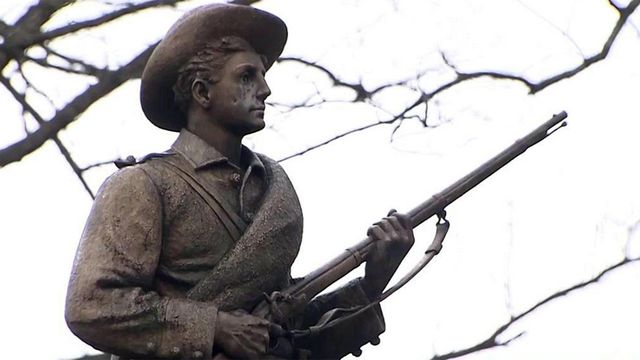'Silent Sam' deal included extra $75,000 to keep Confederate group's flags off UNC campuses
In addition to the $2.5 million the University of North Carolina paid to have the Sons of Confederate Veterans take a controversial Confederate monument from UNC-Chapel Hill, UNC paid the group $74,999 not to meet or demonstrate on any of the system's campuses for five years, according to documents released Monday.
Posted — UpdatedBut the money basically keeps only Confederate flags from being displayed on the campuses.
Under an agreement approved last month by a judge, the SCV agreed to take ownership of the "Silent Sam" statue, which stood for more than a century on the UNC-Chapel Hill campus before protesters toppled it in August 2018, and build a center to preserve it.
Kevin Stone, president of the North Carolina SCV chapter, had suggested in an email to his members after the deal was announced that the money could go toward a new headquarters for the group.
"Some who disagree with this settlement have tried to say it was a deal between UNC and a white supremacy group. This is untrue. The SCV is not a white supremacy group, and just because some people who disagree with us call us that does not make us one," Stone wrote. "The SCV is a group honoring our Confederate ancestors who fought and died between 1861-1865. The SCV does not allow white supremacists in our group, and we do not endorse any such beliefs. Anyone who endorses any of these beliefs is not welcome in our group."
But because the main settlement between UNC and the SCV was approved by a court, the group will be allowed to demonstrate on UNC campuses, provided they comply with campus security policies and procedures and agree not to "display any Confederate flags, banners, or signs" other than individual SCV lapel pins.
Holmes and four other Board of Governors members who helped negotiate the deal – Darrell Allison, Wendy Murphy, Anna Nelson and Bob Rucho – wrote a column defending the deal that ran Monday in newspapers in Raleigh and Charlotte.
"We were given the responsibility to resolve a deeply divisive and personal issue. While we have heard from citizens from across this state who have expressed their gratitude for our efforts of finding a solution to this issue, we also acknowledge that others strongly disagree with the board’s decision to approve a settlement. Compromise was a necessity," the five board members wrote.
"However, we remain convinced that our approach offered a lawful and lasting path that ensures the monument never returns to campus. We believe this agreement not only protects and reduces the risk of violence and physical harm to students, faculty, and staff if the monument had returned to the UNC-Chapel Hill campus, but also ensures the same for our 16 other campuses in the UNC System."
Gov. Roy Cooper joined the growing chorus of opposition to the deal, however.
"I hope the board can fix this. Obviously, this is not good to have our university having foundation grants pulled, and it sends a bad signal, so I hope the Board of Governors can regroup and find a better way to do this," Cooper said Monday.
Cooper said it may be time to seriously consider changes to the way the UNC system is governed. The Board of Governors, all appointed by the Republican-controlled legislature, may have become too centralized, with too much power over how individual campuses are run and not enough accountability to the people of the state, he said.
"We have seen new presidents every year; we’ve seen a lot of interim chancellors," the governor said. "I think it’s time for strong leadership that is dispersed some, that allows more flexibility for our universities."
Related Topics
• Credits
Copyright 2024 by Capitol Broadcasting Company. All rights reserved. This material may not be published, broadcast, rewritten or redistributed.




